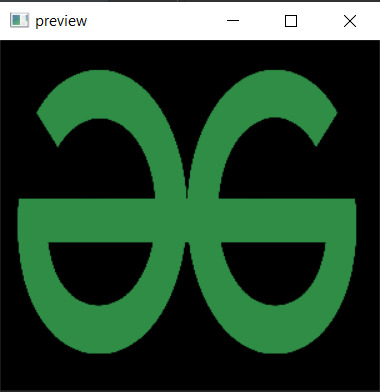本文将讨论如何使用pythonOpenCV startWindowThread()函数。
您想通过OpenCV代码使用简化的接口显示图像和视频吗?然后,您必须查看 OpenCV startWindowsThread() 函数,它可以让您使用高级 GUI 窗口,即用于显示来自 OpenCV 代码的图像和视频的简化接口。
用法:cv2.startWindowThread()
参数:None
返回值:它不返回任何内容。
逐步实施:
步骤1:首先,导入OpenCV库:
这里,我们导入cv2库,cv2是OpenCV包,帮助我们分别调用imread()、startWindowThread()、namedWindow()和imshow()函数。
import cv2
第2步:现在,使用imread()函数读取图像:
在此步骤中,我们使用了 imread() 函数从指定文件加载图像。
img = cv2.imread(path, flag)
- path:待读取图像的路径。
- flag:读取图像的方式。该标志的默认值为 cv2.IMREAD_COLOR。
步骤3:然后,调用startWindowThread()函数来使用高级GUI窗口:
在此步骤中,我们使用了 startWindowThread() 函数,该函数显示用于显示 OpenCV 代码中的图像和视频的简化接口。
cv2.startWindowThread()
步骤4:接下来,为您的 GUI 应用程序指定名称和大小:
在此步骤中,我们使用了 namedWindow() 函数,该函数用于创建一个具有合适名称和大小的窗口,以在屏幕上显示图像和视频。
cv2.namedWindow(window_name,prop_value)
- window_name:窗口的名称。
- prop_value:窗口属性的新值,例如 cv2.WND_PROP_FULLSCREEN、cv2.WND_PROP_AUTOSIZE、cv2.WND_PROP_ASPECT_RATIO 等。
第5步:此外,在 GUI 应用程序上显示图像:
在此步骤中,我们使用了 imshow() 函数,该函数用于在窗口中显示图像。窗口自动适应图像尺寸。
cv2.imshow(window_name, image)
- window_name:表示要在其中显示图像的窗口的名称的字符串。
- image:这是要显示的图像。
第6步:最后,让 python 无限时间休眠:
在此步骤中,我们使用了 waitKey() 函数,该函数允许用户在指定时间或按下任意键之前显示窗口。
cv2.waitKey(0)
例子:
在此示例中,我们使用了图像“gfg_black.png”(link)。我们还使用 startWindowThread() 函数作为显示 OpenCV 代码中的图像和视频的简化接口。
Python3
# Python program for OpenCV
# startWindowThread() function
# Import the library OpenCV
import cv2
# Read the image
img = cv2.imread("gfg_black.png")
# Use high GUI windows
cv2.startWindowThread()
# Name the GUI app
cv2.namedWindow("preview", cv2.WINDOW_NORMAL)
# Display the image on GUI app
cv2.imshow("preview", img)
# Make Python sleep for unlimited time
cv2.waitKey(0) 输出:

相关用法
- Python OpenCV selectroi()用法及代码示例
- Python OpenCV setTrackbarPos()用法及代码示例
- Python OpenCV setWindowTitle()用法及代码示例
- Python OpenCV setWindowProperty()用法及代码示例
- Python OpenCV cv2.circle()用法及代码示例
- Python OpenCV cv2.blur()用法及代码示例
- Python OpenCV cv2.ellipse()用法及代码示例
- Python OpenCV cv2.cvtColor()用法及代码示例
- Python OpenCV cv2.copyMakeBorder()用法及代码示例
- Python OpenCV cv2.imread()用法及代码示例
- Python OpenCV cv2.imshow()用法及代码示例
- Python OpenCV cv2.imwrite()用法及代码示例
- Python OpenCV cv2.putText()用法及代码示例
- Python OpenCV cv2.rectangle()用法及代码示例
- Python OpenCV cv2.arrowedLine()用法及代码示例
- Python OpenCV cv2.erode()用法及代码示例
- Python OpenCV cv2.line()用法及代码示例
- Python OpenCV cv2.flip()用法及代码示例
- Python OpenCV cv2.transpose()用法及代码示例
- Python OpenCV cv2.rotate()用法及代码示例
- Python OpenCV cv2.polylines()用法及代码示例
- Python OpenCV Canny()用法及代码示例
- Python OpenCV destroyAllWindows()用法及代码示例
- Python OpenCV Filter2D()用法及代码示例
- Python OpenCV getgaussiankernel()用法及代码示例
注:本文由纯净天空筛选整理自vin8rai大神的英文原创作品 Python OpenCV – startWindowThread() Function。非经特殊声明,原始代码版权归原作者所有,本译文未经允许或授权,请勿转载或复制。
